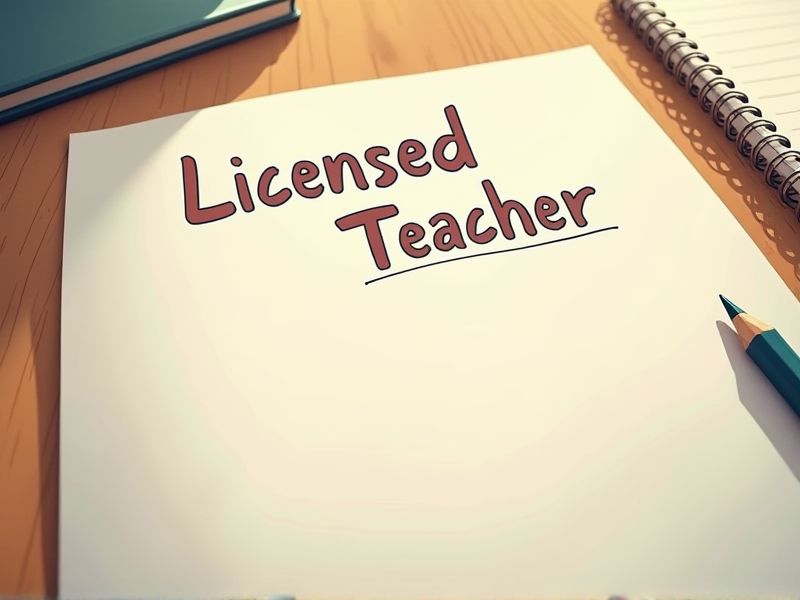
Licensed teachers often require specific certifications to enhance their teaching skills and adhere to educational standards. Certifications ensure teachers are equipped with the latest techniques and knowledge, aligning with current curricular requirements. These credentials help maintain a benchmark of quality and professionalism within educational institutions. Here are some essential certifications a licensed teacher may need.
State Teaching License/Certification
To maintain educational quality, a state teaching license ensures that teachers meet established standards and possess necessary competencies. It provides a framework for accountability, increasing trust among students, parents, and the community. Certification requirements often include examinations and coursework, confirming that teachers are prepared for the challenges of the classroom. This licensing system helps align teachers' skills with educational policy goals, promoting effective learning outcomes.
Bachelor's Degree in Education
A Bachelor's Degree in Education provides essential foundational knowledge in pedagogical theories and instructional methodologies, which are crucial for effective teaching practices. This degree ensures future teachers are well-versed in curriculum design and assessment strategies, enabling them to deliver meaningful learning experiences. Accreditation by educational authorities often mandates such a degree as a prerequisite for licensure to maintain a standardized quality of education. Possessing a Bachelor's Degree in Education helps assure parents and school systems that teachers are adequately prepared to meet diverse student needs.
Praxis Core Academic Skills for Educators Certification
Praxis Core Academic Skills for Educators Certification establishes a standardized benchmark for assessing essential academic abilities in reading, writing, and mathematics, crucial for effective teaching. Its requirement ensures that all licensed teachers possess a fundamental level of proficiency necessary to understand and deliver educational content efficiently. The certification enables consistency across different states, fostering nationwide educational standards. Passing the Praxis exam also reflects a teacher's commitment to professional competency and readiness to enter the classroom environment.
Praxis Subject Assessment Certification
Praxis Subject Assessment Certification ensures that teachers possess a deep understanding of the subject matter they intend to teach, directly impacting the quality of education students receive. When teachers are certified, schools maintain a standard of teaching that aligns with state and national educational requirements. Students benefit from this certification through enhanced learning experiences, as certified teachers are proven to have the knowledge and skills necessary for effective instruction. Failure to obtain this certification can result in teachers lacking essential competencies, which may lead to suboptimal educational outcomes for students.
Special Education Endorsement
A Special Education Endorsement equips licensed teachers with specialized skills to effectively support students with diverse learning needs. This endorsement enhances a teacher's ability to differentiate instruction, which can lead to improved academic outcomes for students with disabilities. It contributes to more inclusive classroom environments, fostering a sense of belonging for all learners. State education agencies often have mandates requiring such endorsements to ensure that educators meet regulatory standards for special education.
ESL/TESOL Certification
Licensed teachers often pursue ESL/TESOL Certification to enhance their ability to effectively instruct non-native English speakers. This certification provides specialized training in language acquisition, which is not typically covered extensively in standard teacher education programs. Schools are increasingly diverse, so having ESL/TESOL certification makes teachers more adaptable to various classroom settings. Many educational institutions prioritize or require this certification for teachers handling multilingual student populations to improve overall school performance.
Classroom Management Certification
A Classroom Management Certification equips licensed teachers with essential skills to handle diverse classroom dynamics effectively. Teachers with this certification often report improved student engagement and fewer behavioral issues, enhancing the overall learning environment. Research indicates that teachers trained in classroom management contribute to higher academic achievement among students. Schools increasingly prioritize these certifications as they aim to align with effective teaching practices and improved school-wide discipline policies.
Educational Technology Integration Certification
Certified integration in educational technology enhances a teacher's ability to effectively incorporate digital tools in the classroom. As a result, students experience more engaging and interactive learning environments. This certification aligns with current educational standards, ensuring teachers meet technological competencies. Schools that employ certified teachers often see improvements in student performance and digital literacy.
Literacy Instruction Certification
Literacy Instruction Certification enhances a teacher's ability to effectively foster foundational reading and writing skills in students, which is crucial for academic success across disciplines. Teachers with this certification are better equipped to identify and support students with diverse literacy needs, thereby improving overall classroom performance and equity in education. Schools benefit from having certified teachers as it elevates the institution's educational standards and outcomes, improving its reputation and attracting more students. Continuous professional development through this certification keeps teachers updated with the latest methodologies and research, ensuring they employ effective, evidence-based practices.
Professional Development in Educational Leadership Certification
Teachers who pursue a Professional Development in Educational Leadership Certification often enhance their leadership skills, which can lead to improved school management and student outcomes. This certification helps educators stay updated with the latest educational trends and policies, ensuring they effectively address contemporary educational challenges. Teachers with leadership training are more equipped to mentor colleagues, fostering a collaborative and progressive learning environment. Schools with leadership-certified educators generally experience higher staff retention rates, as these teachers often contribute to positive working conditions.
Summary
When you acquire additional certifications as a licensed teacher, your marketability and job prospects improve significantly. Enhanced skills often lead to better student outcomes, as you're equipped with diverse teaching strategies. Certification in specialized areas can also increase your salary potential, providing a clear career advancement pathway. Gaining recognition in specific subjects enables you to contribute more effectively to your educational community.
